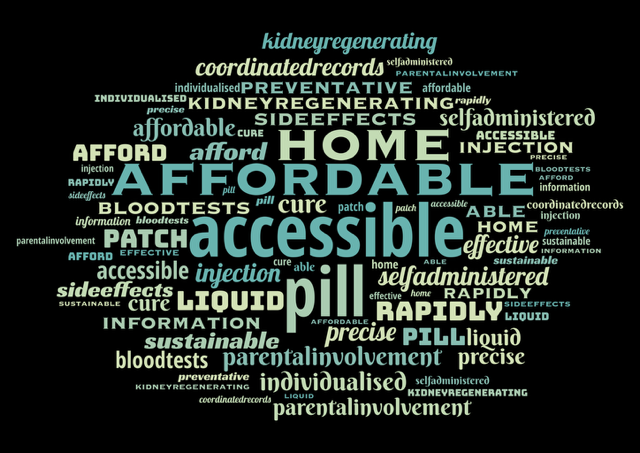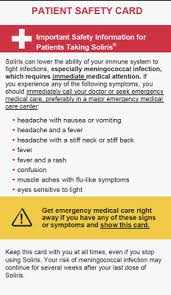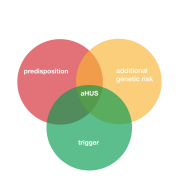Today is World Kidney Day. An annual awareness day to bring kidney disease matters to the world’s attention.
aHUS is a kidney disease , a very rare one. The “U” in HUS tells us of that.
There are probably less than 25,000 surviving aHUS patients at varying stages of kidney disease. Many in poorer countries on dialysis. So advancing equitable access to care and optimal medication practice is something the aHUS community identifies with.
As a rare disease aHUS is dependent on expensive effective treatment to avoid kidney failure t and there is inequity in access to treatment. Part of that is down to not yet establishing optimal care for each patient that is affordable around the world. This was something expressed by the aHUS community on Rare Disease Day 2024. As reflected in the word cloud below.

Global Action attended the first of two webinars being held by the International Society of Nephrology on World Kidney Day 2024 on the subject “Advancing equitable access to care and optimal medication practice.”
This is some of what the experts had to say about it,

| Moderators |
| Ifeoma Ulasi, ISN (Nigeria) SF Lui, IFKF-WKA (Hong Kong) |
| IU welcomed everyone to the webinar and introduced SFI who introduced the speakers and the President of ISN Masaomi Nangaku. MN explained that the theme for this year’s WKD was ” Advancing equitable access to care and optimal medication practice”. In the past three decades the focus of kidney treatment had evolved from just renal replacement therapy focus to prevention, delay and mitigating of kidney disease through new medicines. Low medium and some high income countries still face disparity in access to care. 3.1 million died from kidney disease in 2019, 1 person every 6 seconds. It is the 7th largest risk of death. He handed on to Latha Kumaraswami, IFKF-WKA President (India) who added a welcome. |
| Speakers |
| Valerie Luyckx, ISN (Switzerland) Dina Abdellatif, IFKF-WKA (Egypt) |
| A video was shown: 3 major causes of kidney disease : High BMI- 1 in 5 have CKD High systolic blood pressure 1.3 million people have hypertension , most don’t know and few are treated High plasma glucose 527 million diabetes CKD in 2021, 75% in low/medium income countries Less than 20% of those with CKD know they have it. “Protect your kidneys save your heart” Testing urine , EGFR, and imaging Expected to the 5th leading cause of death by the 2040s. DA New medicines available to prevent and delay disease but few patients know they have the disease to benefit from them. Also it is takes 17 years on average from getting evidence about treatment and to putting it into clinical practice. From KNOWLEDGE to ACTION. There is a gap due to barriers of patient awareness, clinician knowledge, socio economic factors, health systems and policy. It needs all to be addressed and removed in a multi disciplinary way NO ONE PERSON CAN WHISTLE A SYMPHONY ON THEIR OWN IT TAKES A WHOLE ORCHESTRA |
| Patients’ perspective |
| Bill Wang, ISN Patient Liaison Advisory Group and member of IFKF-WKA (Hong Kong) A PKD patient , 6 years. Fortunate to have affordable /quality care. Paid tribute to health care professionals around the world on WKD 2024 Suggested ways for better patient counselling , an appropriate environment, consideration of feelings and coaching. A Communication “Bridge” is essential Overcome jargon Gain trust in a safe treatment plan Be multidisciplinary Personalised Plans Think Art v Science Patient Centred Approach Manvir Victor, ISN Patient Liaison Advisory Group (Malaysia) 24 years with kidney disease Size of the clinicians task. Currently there is a world population of 8.1 billion and 0.8% of the population treat them when ill. 65.1 million health care workers, including – 29m nurses -12m doctors -3m Pharmacists -2m Dentists -2m Mid wives -14m other healthcare professional How are they going to keep up with population growth? Through engagement with, education of , and empowerment for the patients. A collaboration in a multidisciplinary approach. AI maybe! |
| A Question & Answer session followed about such matters as current research, overcoming barriers to clinical trials, how to wisely spend resources and achieve equity between all demands. The author asked this question on behalf of those with kidney disease because of a rare disease ( aHUS) : As a kidney disease patient predisposed to a causal rare disease I can doubly see the equity issues. How can rare kidney disease be visible along with the common disease in seeking equity given high medicine prices? An excellent webinar thank you. Answer: ( Valerie Luyckx ) Great question – advocacy is trying to push for recognition of rare disease and access to the expensive medications…especially in pediatrics, transplantation, and genetic diseases – ISN is advocating as is the European Kidney health Alliance. Several recent papers on this topic. Very key to have patient voices* please reach out and engage with us. |
| Meeting closed by ISN president reiterating the 3 E’s , Engage. Educate ,and Empower to drive up patient drug literacy. And LISTEN. |
* Global Action engaged with ISN at its Frontiers symposium in Bergamo. Bergamo- A Report on aHUS – aHUS Alliance Action
A second session of the webinar will be held in the west today at 11pm CET.
Article No. 647


